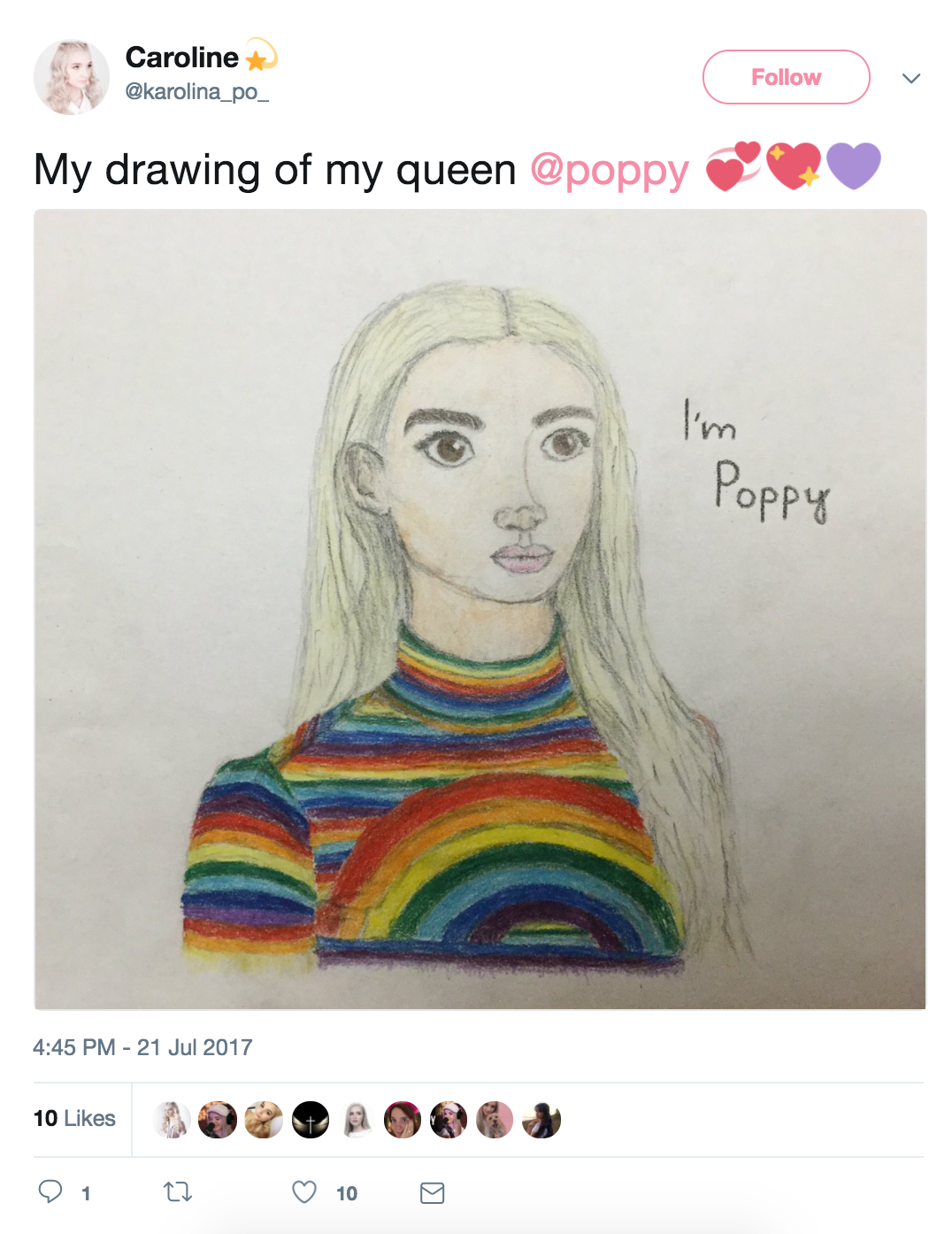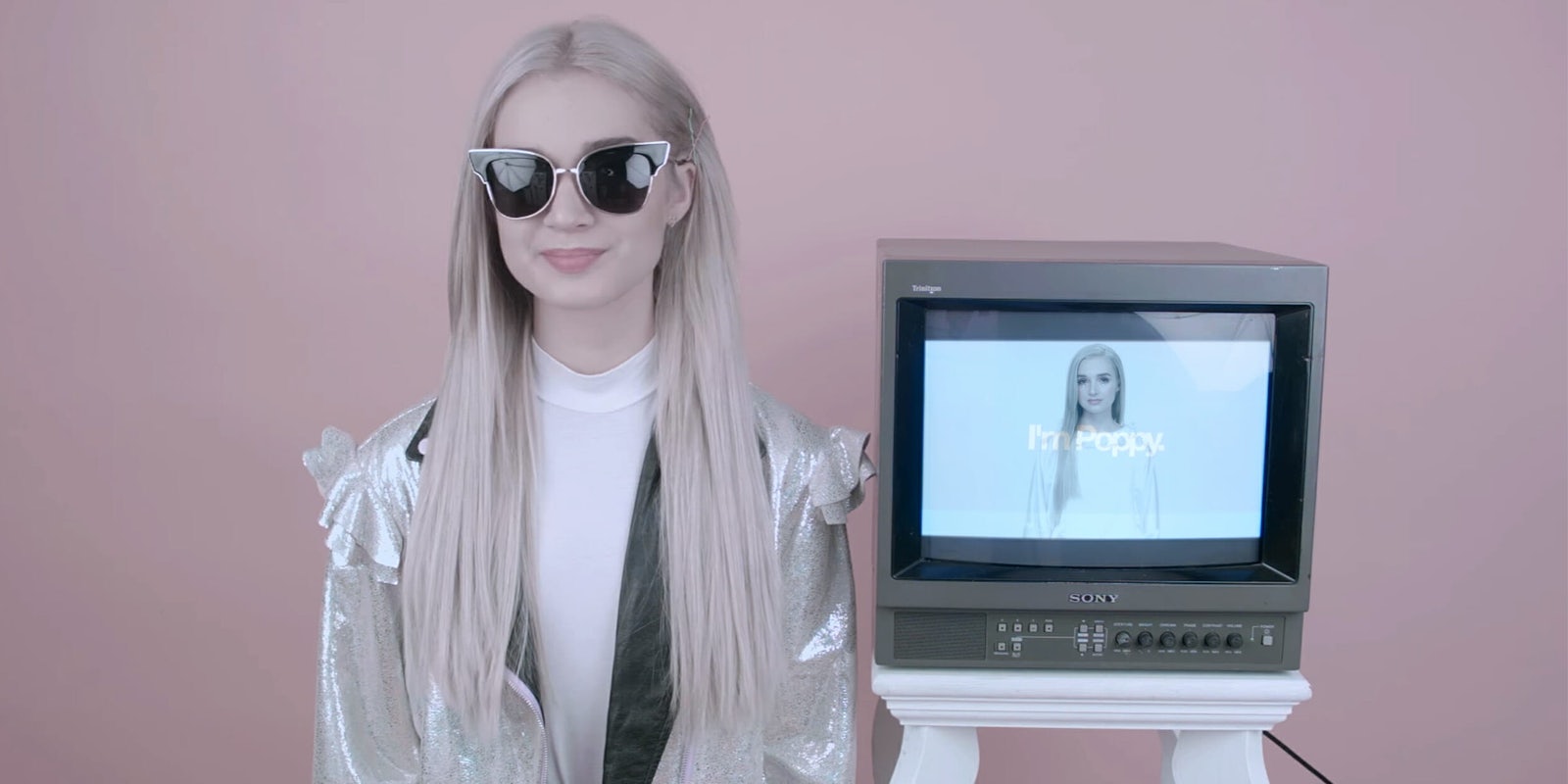The pop star of the future isn’t a person, exactly. She’s an android, a suspected cult leader, a carefully cultivated brand. She’s got bleach-blond hair, huge eyes, and robot-perfect makeup. She wears cute, girlish clothes inspired by Japanese fashion and describes her aesthetic as “Barbie kawaii child.” She lives on the internet and loves social media unconditionally. She speaks in short sentences, with the gentle, almost ASMR-like voice of a child. She could be 15, or she could be 25. It doesn’t matter. She’s Poppy.
Poppy seems to work inhumanly hard. She has a surreal YouTube channel that updates almost daily, where she talks in soothing robotic monotone about the things she loves: technology, social media, the internet, and her fans. She releases a regular trickle of new music, always with accompanying videos. She’s also the subject of an alternate reality game and several fan-driven conspiracy theories, many of which center around her enigmatic producer/collaborator Titanic Sinclair.
Is Poppy a puppet of the Illuminati, the shadowy power-brokers who allegedly control contemporary society? Is she a secret government mind control project? Is she “real,” or just a PR stunt? Is someone forcing her to make YouTube videos against her will? And if so, who?
These are all questions that obsessive Poppy fans feel driven to answer, working to crack the mysteries of Poppy’s real identity and the science-fiction story she and Titanic are spinning across the internet. And once you go down the rabbit hole with Poppy, it’s hard not to follow it all the way to the bottom.
‘If it’s on the Internet, it’s real!’
Poppy has a real name. You can find it on Wikipedia. She also has a real age, which isn’t hard to find on public records search sites and in YouTube videos from fans. Titanic Sinclair has a real name, too, but he sacrificed it a decade ago, he said, to gain more control over what the internet knows about him. He chose his alias because it was unique and highly Googleable. The official story, according to Poppy’s few out-of-character interviews, is that she grew up in Nashville and was raised by a musician dad. She initially made some videos and music on her own, but then she met up with Titanic, relocated to L.A., and became Poppy.
These biographical facts about Poppy and Titanic don’t matter, though. They’re incidental to the character Poppy is playing and her multi-layered commentary on celebrity and the internet.
Many of Poppy’s fans interact with her as if she’s a traditional pop star: The girls wear Poppy insignia rings and worship her as their “queen,” while the boys lust after her and call her their “waifu.” They’ve dubbed themselves “Poppy Seeds,” the same way Beyoncé stans are the Beyhive, or Rihanna fans are the Navy. They change their Twitter bios to commemorate the day she followed them back.

Like other pop stars, Poppy sings. She releases upbeat, danceable tracks about her interests, with the support of a record label. Her first full-length album will drop later this year, and she’s embarking on her first U.S. tour in October. In this way, she’s not so different from any other pop personality manufactured for mass appeal.
But while pop stars like Taylor Swift strategically reveal flashes of their personality and imperfections to make themselves more human and approachable to fans, Poppy is the opposite: She intentionally hides the evidence of her humanity. In videos, she never breaks the smooth façade of a childlike alien or android. Her interviews, too, are mostly in character. Titanic Sinclair has sometimes lashed out at fans for discussing the name or age of the woman behind Poppy, sharing her old videos, or otherwise spoiling the illusion.
“I don’t want people to talk about how old I am; I want them to talk about what I’m making,” Poppy told the website Racked last year in a rare out-of-character interview.
Is Poppy a straightforward parody of internet fame, or is she simply taking it to its most absurd logical extent, burying her real identity and replacing it with a perfect kawaii fame-bot? Is she “real”?
Poppy, the character, knows what her answer is—“If it’s on the Internet, it’s real!”—but so much of the fun and genius of Poppy is in peeling back her many layers.
You can enjoy Poppy as a straight-up pop music performer, and there’s no doubt that many fans engage with her on that level. Her songs, produced by Titanic, are as catchy as anything on Spotify‘s hot playlists this week, and you can read her overt weirdness as just an aesthetic. Her look is cool, futuristic, and clearly inspired by Japan, where she recorded her forthcoming debut album. She talks about social media and major brands and seems to be poking fun at consumerism and the way our online identities are now bought and sold by marketers.
But there’s much more to Poppy than a glossy surface or a superficial critique of the social media marketing complex. She’s something different: a work of pop art.
Titanic has spoken favorably in interviews about the original pop-art icon, Andy Warhol. In particular, he cited Warhol’s Brillo boxes and Campbell’s soup cans, praising them for playing with instantly recognizable icons.
In 2017, our icons are mega-corporations like Apple, Google, and Facebook, and Poppy and Titanic bring those to bear in Poppy’s videos. Poppy often speaks positively of these huge brands, and professes to be happy about what they’re doing to her life: “I like to use the website Facebook and also the Facebook app on my Apple iPhone,” she says in one video. In another, “I like to purchase things on Amazon.com.”
You can even draw a direct line from Warhol’s “Screen Tests,” which are essentially extended shots of his celebrity friends, to the style of Poppy’s YouTube videos:
In a candid 2016 interview with Dom’s Sketch Cast, Titanic Sinclair referred to Poppy as an “android” and “a very human-like being who one day approached me and I decided to document her.”
Even her android nature is perfectly Warholian. He was obsessed with “the mechanization of celebrity.” Stars like Marilyn Monroe and Elvis, who Warhol endlessly reproduced in silkscreen, were all subsumed into America’s icon factory and converted into symbols, completely disconnected from the troubled real people they once were.
“Machines have less problems. I’d like to be a machine,” Warhol once said, “Wouldn’t you?”
Now imagine those words in Poppy’s voice. Fits perfectly, doesn’t it?
But Poppy is a different kind of machine, built for a different time. The internet and social media have enabled a celebrity factory that’s more brutal and more efficient than ever before. We’re all strapped into Facebook, YouTube, and Instagram, riding Warhol’s obsession with fame, iconography, and immortality to its logical conclusion. That conclusion might look something like Poppy.
“The fun part about it,” Titanic told Dom’s Sketch Cast, “is presenting her to the world in a way that is done with a bit of an artistic… almost that Warhol thing we were talking about.
“It’s fun watching people figure it out.”
But people aren’t even close to figuring it out, because underneath Poppy, the peppy, enigmatic pop robot, there’s an even deeper and more bizarre science-fiction backstory.

‘Computer Boy Only Loves Poppy’
Behind Poppy, the pop star who sings songs like “Interweb” and “Let’s Make a Video,” there’s something that looks like a sinister conspiracy. Poppy’s YouTube videos and some of her interviews provide bits and pieces, but the most extensive source of Poppy’s “real” story is an alternate reality game (ARG) called Computerboy.computer, hosted by the online entertainment company Super Deluxe.
Obsessives on the Poppy subreddit and a dedicated Discord chat have been working on cracking the game’s mysteries for months. They get clues from “Computer Boy,” who might represent Poppy’s laptop computer, an old online boyfriend, or a nascent artificial intelligence, depending on who you ask. Poppy has dedicated an entire song to him.
In the story of the ARG, Poppy is apparently being held captive by “Them” in some kind of medical facility; photos show her being wheeled into the building on a stretcher and hooked up to an IV. Computer Boy seems to be attempting a rescue mission by communicating with Poppy fans and feeding them clues about secret passwords.

In Poppy’s YouTube videos and interviews, she often makes references to things “They” won’t let her do. She can’t have a boyfriend or girlfriend “yet,” for example. In one video, she says, “I used to be more honest but now They won’t let me.” “They” are apparently the ones conspiring to make Poppy a celebrity.
After a back-and-forth with Computer Boy, who signed on to chat daily at 3:36 (Poppy’s favorite time of day and the name of her ambient music album with Titanic), the fans guessed his secret password. It turned out to be a variation on “Computer Boy only loves Poppy.”
This unlocked a series of emails sent by Computer Boy to Poppy. The early messages, dated 2014, are mundane, and they substitute numbers for many of their letters. (In fact, the first one is entirely in binary—just 1s and 0s.) As time went on, Computer Boy dropped the numbers and grew more urgent about the danger Poppy is in.
“I r3c0gnize that voice. It was th3 one fr0m the dr3am. What did they giv3 you, P0ppy? I th0ught that after phas3 0ne you could 1eave. ??? ← this m3ans i am inquisitiv3!”
Computer Boy makes references to working with “Them” and learning things from “Them” but also implies that They’re keeping Poppy in some kind of artificial sleep.
“i miss you. please wake up • charlie,” reads one of the most recent messages.
Is Computer Boy an ex-boyfriend named Charlie? Is he, as Poppy sings in the song, her laptop computer? One clever theory holds that Computer Boy is “a literal evolving artificial intelligence speaking to Poppy,” and that he may have adopted the name “Charlie” as he’s grown increasingly human.
Poppy continues to develop the story in her YouTube videos, especially a recent live interview announcing her U.S. tour. In the video, she delivers her most explicit hints yet about what might be going on: “I remember the first time They had me sing into a microphone,” she says, “They told me I could be a famous singer. All I had to do is exactly what They say. They’re a lot of fun. Sometimes They are not nice to me.”
She also brings up something called “the secret of the forgotten children,” but when she’s pressed for details, she says, “They won’t let me tell you. They told me not to talk about it; now They’ll be angry.”
In another new video on Titanic Sinclair’s channel, a recurring character named Charlotte (a talking mannequin who sometimes interviews Poppy) tells Titanic “everyone knows what you are up to” and “it’s only a matter of time” before Poppy finds out.
It seems that, as Poppy’s real-life tour and album approach, the revelation of her secret origins is accelerating.
Many of Poppy’s fans don’t care, or maybe aren’t even aware, of the ARG or the puzzle of her identity. But to some, it’s the reason to follow Poppy in the first place. It’s what sets her apart from the normal pop stars she was built to emulate.
“People, especially nowadays, are so obsessed with knowing everything. They’ll have to invest their time in finding it,” Poppy told Racked.
And that’s exactly what these fans do. They dig up every scrap of information they can find pertaining to Poppy, Titanic, and “Them.” They search for hidden messages in Poppy’s songs, unearth suspicious documents on Titanic’s website, and have pet theories about who Poppy “really” is: A clone? A robot? A kidnapped child raised from birth to achieve pop transcendence?
One prevailing theory, so popular that Poppy and Titanic have both had to address it, is that Poppy is in (or leads) some kind of cult. In one video on the subject, Poppy intones “I am not in a cult. Titanic Sinclair is not a cult leader.” Of course, the video is somewhat tongue-in-cheek, with Poppy speaking the line “Say it with me, ‘I am not in a cult. I am not in a cult.’”
Months later, Titanic took the joke even further. He made a video where he restated that he and Poppy are not cult leaders, and then announced he was selling T-shirts that read, “I am not in a cult led by Poppy.” Poppy as a creepy mind-control project meets Poppy as the perfect commercial entity in a single, perfect piece of branded merch.
Of course, the shirt only encouraged the “cult” speculation even further. Add that to a page on Titanic’s website called “Oath.html,” which appears to be a pledge of loyalty to something called “The Order,” and you’ve got enough fuel to keep fans going for months. The cursor on the oath page even looks like an Illuminati pyramid.
The “cult” hypothesis is one of the most popular with Poppy’s mainstream fans, the ones who adore her as simply a weird pop idol. Modern pop stars like Beyoncé are often accused by teens of being in the Illuminati, an ancient organization said to run the world. It would only be fitting that Poppy would have Illuminati connections, too.
Sometimes, though, Poppy’s fascinated followers think of things Titanic himself may not have noticed. Fans discovered by analyzing metadata from the photos that the mysterious hospital from the ARG is near the real-life YouTube Space Los Angeles. The building has served as a filming location for a number of YouTube celebs. They also checked the numbers on a helicopter seen outside the building and learned it was decommissioned and bought by YouTube parent company Google. These facts, like Poppy’s real name, have nothing to do with the fictional character “Poppy” and her story, but they get caught in the dragnet of fan obsession just the same.
One YouTuber, Repzilla, has posted dozens of videos discussing Poppy and Titanic’s real names and ages, along with theories about Titanic’s ex-girlfriend, Mars Argo, who used to make Poppy-like videos. He also speculates about the story behind Poppy and meticulously analyzes each new music video she releases. He even plays the songs backward, searching for clues.
Despite the free promotion this represents for Poppy’s music and her mystery, Titanic Sinclair has been hostile to Repzilla and the internet’s most hardcore Poppy detectives. He’s maintained a Reddit account since well before his Poppy project started, and he sometimes uses it to chastise Poppy fans on the site who insist on referring to Poppy and Titanic by their real names. He’s claimed on Reddit that he keeps a folder full of screenshots of Poppy fans saying negative things about him online, and he exposes fan-created projects that add to the Poppy mythos and pretend to be official.
Repzilla claims Titanic filed copyright takedowns on his videos in retaliation for revealing the duo’s real names and Poppy’s age.
Repzilla also shared an email, allegedly sent to him by Titanic, that makes reference to Repzilla’s own personal life, friends, and family. To Repzilla, the message implied Titanic had dug through his Facebook page, perhaps to show him what it feels like to be investigated online.
“When I told him that I had nothing against him and that my videos were just fun, and entertainment that the community wanted, he responded with, ‘It’s honestly disgusting, dude. You are so disrespectful to me, Poppy, and Mars. Please take that stuff down,'” Repzilla told the Daily Dot. (Titanic Sinclair did not respond to the Daily Dot’s requests for comment.)
Repzilla’s Poppy videos were later restored after a copyright appeal to YouTube, and he’s continued to investigate Poppy conspiracy theories since then.
“I can’t call myself a fan,” he told the Daily Dot, “but what initially turned me onto the project was the way that it used, very clearly marketing techniques, in an almost, sort of, like, grandiose, in-your-face type-of way.”
Once he’d gotten sucked in by Poppy’s mystique, he encountered obsessive fans who encouraged him to continue. Now he sees himself as their unofficial spokesman. Although the community’s feelings about him are mixed—some take issue with the fact that he’s not a devoted Poppy fan—he’s certainly the highest profile Poppy-watcher online.
“The thing that keeps me making videos on [Poppy] actually has nothing to do with her,” he said,
“I am most fascinated by the community around them, the cult following; I have become a sort of voice for that community.”

‘Death is the only reason I make content’
Titanic’s endgame for Poppy may not be clear yet, but you can be certain he has one. In his extensive 2016 interview with Dom’s Sketch Cast, he was asked how far ahead he’d planned Poppy.
Titanic answered, “Very far.”
Past death?
“Death is the only reason I make content,” he said.
Whose death? His own? Poppy’s? We’ll see as the story continues to unravel.
The Poppy project combines two obsessions that Titanic Sinclair seems to share with Warhol: celebrity and death. Specifically, the use of celebrity to cope with the fear of death (and perhaps to transcend death itself) by creating something that will live on long after the creator is gone.
So far, Poppy is off to a good start. She has nearly 200 million YouTube views, a tour, a new album, and she’s getting mainstream attention from the likes of Wired magazine and The Late Late Show with James Corden.
The hypnotic thrum heard in the background of all of Poppy and Titanic’s YouTube videos has now been broadcast to millions of CBS viewers. If it’s immortality Titanic is after, he and Poppy are well on their way.

